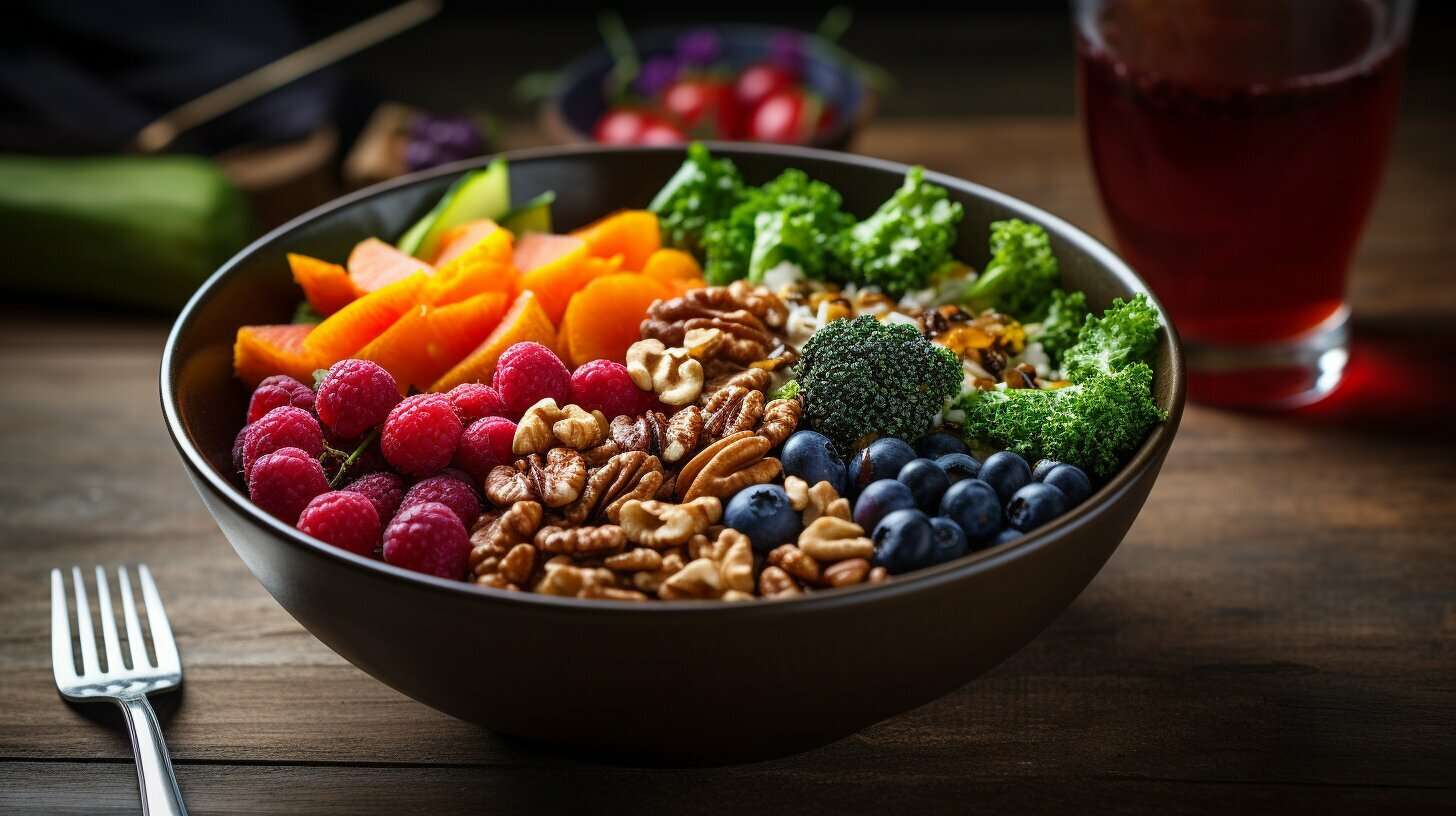Did you know that maintaining a healthy gut is crucial for your overall well-being? Your gut plays a vital role in digesting food, absorbing nutrients, and removing waste from your body. A healthy gut can improve your digestive system, and immune function, and even promote mental health.
The food you consume can significantly impact your gut health. Incorporating gut-friendly foods into your diet is essential to support a healthy gut. Here are some of the best foods for gut health:
Key Takeaways:
- A healthy gut is essential for overall well-being.
- The food you consume can impact your gut health.
- Incorporating gut-friendly foods into your diet is crucial for maintaining a healthy gut.
The Gut-Brain Connection: How Diet Affects Gut Health
Did you know that the food you eat can impact your gut health and subsequently affect your brain function? The gut-brain connection is a complex relationship where the state of your gut can influence your emotions, behavior, and cognition.
Your gut is home to trillions of bacteria that make up your gut microbiome. These bacteria play a vital role in digestion, nutrient absorption, and immune function. The food you eat can either nourish or harm the bacteria in your gut, affecting the balance of beneficial and harmful microbes.
Consuming a balanced diet rich in gut-healing foods can support the growth of beneficial bacteria and promote a healthy gut. On the other hand, a diet high in processed foods, sugar, and unhealthy fats can lead to inflammation, gut damage, and an imbalance of gut bacteria.
The Best Foods for Gut Health
Include these gut-healing foods in your diet to support a healthy gut:
| Food | Benefits |
|---|---|
| Probiotic-rich foods (yogurt, kefir, kimchi) | Supports beneficial gut bacteria and immune function |
| High-fiber foods (fruits, vegetables, whole grains) | Improves digestion and bowel movements |
| Anti-inflammatory foods (berries, leafy greens, fatty fish) | Reduced inflammation throughout the body, including the gut |
| Fermented foods (sauerkraut, miso, tempeh) | Supports a healthy gut microbiome and gut lining |
| Herbs and spices (turmeric, ginger, peppermint) | Anti-inflammatory and antimicrobial benefits for the gut |
Incorporating these gut-friendly foods into your diet can provide the nutrients your gut needs to thrive. Aim for a varied diet rich in whole foods to promote a healthy gut-brain connection.
Note: Consult your healthcare provider before making any major dietary changes.
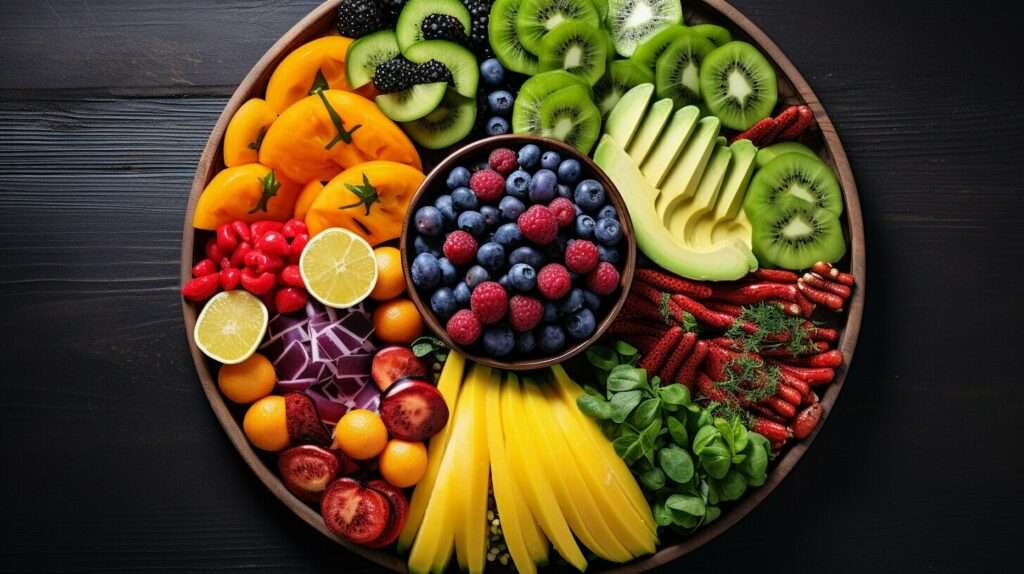
Fiber-Rich Foods for a Healthy Gut
Fiber is an essential nutrient for maintaining a healthy gut. It promotes regular bowel movements, prevents constipation, and feeds beneficial gut bacteria. Including fiber-rich foods in your diet can support digestive health and overall well-being.
Check out the following list of fiber-rich foods:
| Fruits | Vegetables | Legumes | Whole Grains |
|---|---|---|---|
| Apples | Artichokes | Beans | Oats |
| Berries | Broccoli | Chickpeas | Quinoa |
| Oranges | Carrots | Lentils | Brown Rice |
| Pears | Brussels Sprouts | Peas | Whole Wheat Bread |
| Avocado | Spinach | Soybeans | Barley |
Incorporating these fiber-rich foods into your daily diet can help support your gut health and improve your overall wellness. Aim to consume at least 25-30 grams of fiber each day to ensure optimal digestive function.
Note: If you have a digestive disorder, such as irritable bowel syndrome (IBS), speak to your doctor before increasing your fiber intake.
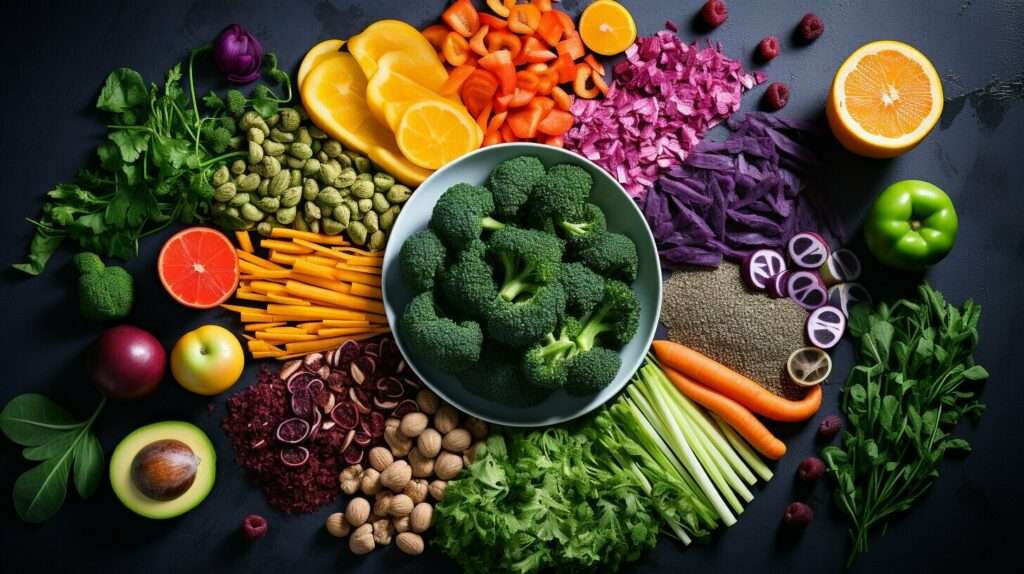
Probiotic Foods: Nurturing Good Gut Bacteria
If you’re looking to support your gut health, probiotic-rich foods are a great place to start. These foods contain live beneficial bacteria that can help restore and maintain a healthy balance of gut flora.
Probiotics support digestion and nutrient absorption, and can even help protect against harmful pathogens. They also play an important role in regulating the immune system and have been linked to better mental health and cognitive function.
Here are some probiotic-rich foods to add to your diet:
| Food | Probiotic Strains |
|---|---|
| Yogurt | Lactobacillus bulgaricus, Streptococcus thermophilus, Lactobacillus acidophilus, Bifidobacteria |
| Kimchi | Lactobacillus plantarum, Lactobacillus brevis |
| Kefir | Lactobacillus acidophilus, Bifidobacterium bifidum, Streptococcus thermophilus |
| Miso | Lactobacillus plantarum, Lactococcus lactis, Leuconostoc mesenteroides |
| Sauerkraut | Lactobacillus plantarum, Lactobacillus brevis, Leuconostoc mesenteroides |
It’s important to note that not all products labeled as “probiotic” contain live and active cultures. Look for products that specifically state the presence of live cultures and try to incorporate a variety of probiotic-rich foods into your diet for optimal gut health.
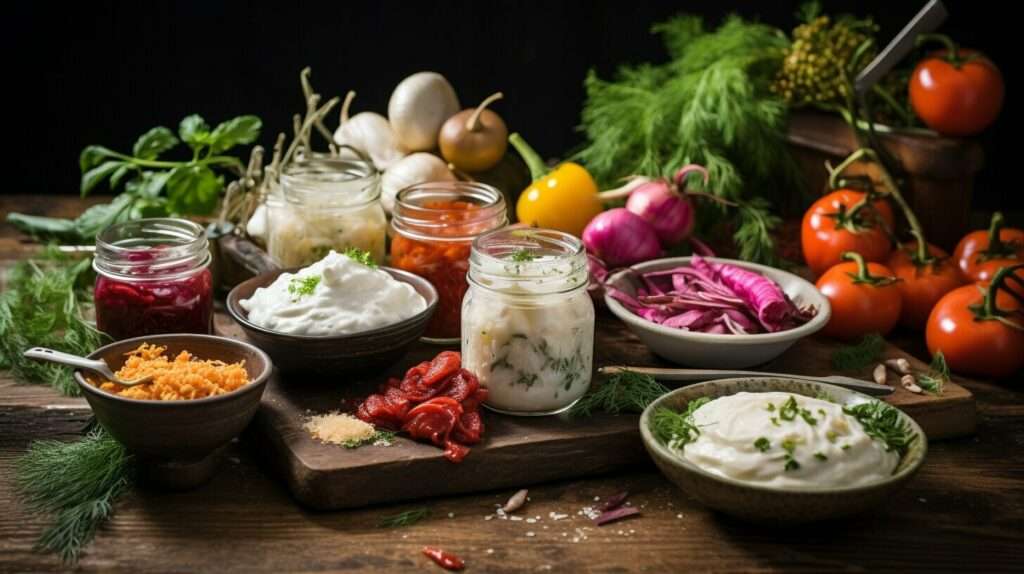
Anti-Inflammatory Foods for Gut Health
Chronic inflammation can wreak havoc on the gut, leading to digestive issues such as bloating, gas, and constipation. Incorporating anti-inflammatory foods into your diet can help soothe inflammation and promote gut health.
Here are some anti-inflammatory foods to add to your grocery list:
| Foods | Benefits |
|---|---|
| Fatty fish (salmon, mackerel, tuna) | Rich in omega-3 fatty acids, which have anti-inflammatory properties. |
| Leafy greens (kale, spinach, collard greens) | Contain anti-inflammatory compounds, as well as fiber for digestive health. |
| Berries (blueberries, strawberries, raspberries) | Packed with antioxidants that combat inflammation. |
| Nuts and seeds (almonds, walnuts, chia seeds, flaxseeds) | Rich in healthy fats and fiber, which support gut health and reduce inflammation. |
| Turmeric | Contains curcumin, a potent anti-inflammatory compound. |
Incorporating these foods into your diet can help reduce inflammation in the gut and promote a healthy digestive system. For recipe ideas, search online for dishes that feature these gut-friendly ingredients.
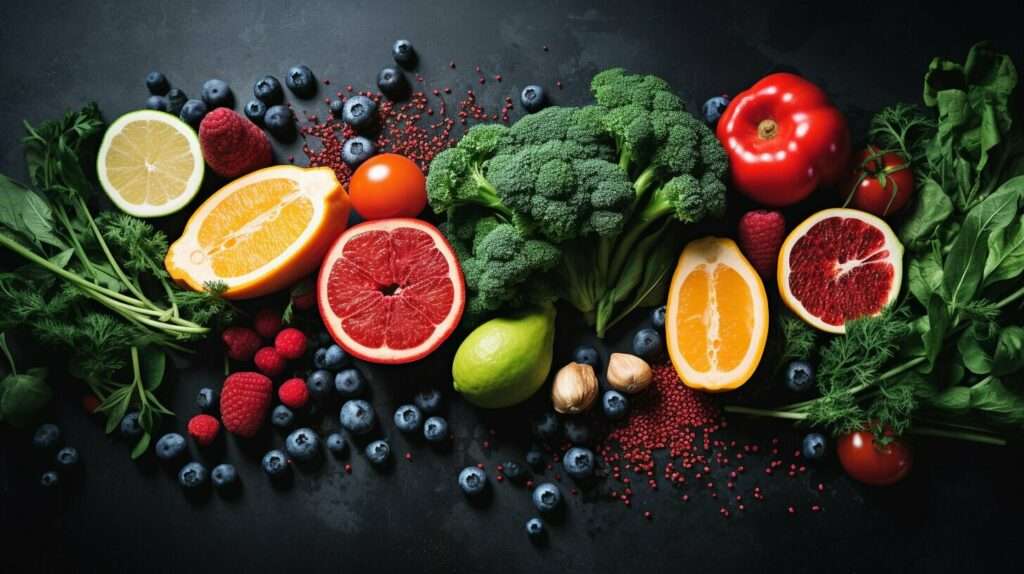
Fermented Foods: Enhancing Gut Health Naturally
Fermented foods are a great addition to your diet as they not only enhance the taste of your meals but also offer numerous health benefits. These foods are rich in probiotics, which are beneficial bacteria that aid digestion and improve gut health. Consuming fermented foods can help maintain a healthy balance of gut bacteria, boost your immune system, and reduce the risk of chronic diseases.
Here are some fermented foods that you can add to your diet:
| Fermented Food | Benefits |
|---|---|
| Kombucha | Rich in probiotics and antioxidants. Helps boost energy and immunity. |
| Sauerkraut | Contains probiotics, fiber, and vitamins C and K. Helps improve digestion and reduce inflammation. |
| Miso | Rich in probiotics and antioxidants. Helps improve gut health and boost immunity. |
| Kefir | Contains probiotics and beneficial yeast. Helps improve digestion, boost immunity, and reduce inflammation. |
| Kimchi | Rich in probiotics, vitamins, and antioxidants. Helps improve digestion and reduce inflammation. |
Adding these fermented foods to your diet is an easy way to enhance your gut health naturally. You can incorporate them into your meals as a side dish or snack. Experiment with different types of fermented foods to find the ones that suit your taste buds.
Image source: 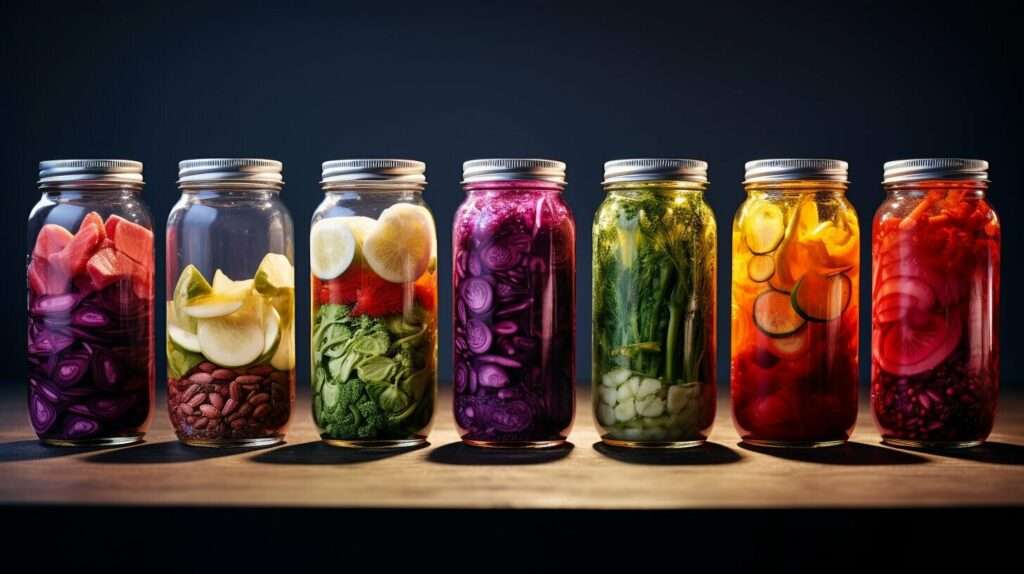
The Gut-Supporting Power of Herbs and Spices
Herbs and spices don’t just add flavor to your meals, they can also benefit your gut health. Many herbs and spices have antimicrobial, anti-inflammatory, and digestive properties that can support a healthy gut.
Cumin: This spice is known for its anti-inflammatory properties and can help improve digestion by stimulating the production of digestive enzymes.
Ginger: Ginger is a natural anti-inflammatory and can help soothe digestive issues such as nausea and bloating. It can also improve nutrient absorption in the gut.
| Herbs | Properties |
|---|---|
| Peppermint: | Can help relieve digestive discomfort and reduce inflammation in the gut. |
| Turmeric: | Contains curcumin, which has potent anti-inflammatory effects and can improve gut health. |
Garlic: Garlic has antimicrobial and anti-inflammatory properties that can promote a healthy gut microbiome. It can also improve digestion and reduce bloating.
Rosemary: Rosemary contains antioxidants that can protect the gut from damage caused by free radicals. It can also improve digestion by stimulating the production of bile.
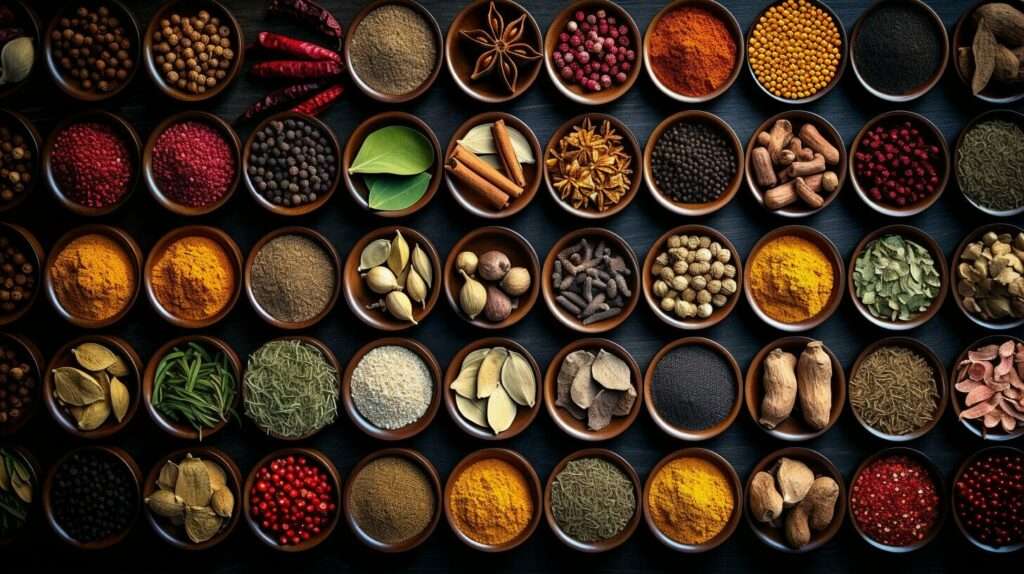
By incorporating these herbs and spices into your meals, you can support your gut health and improve digestion. Consider adding them to soups, stews, marinades, and dressings for a gut-friendly boost of flavor.
Foods to Avoid for a Healthy Gut
Your diet plays a crucial role in maintaining a healthy gut, but certain foods can wreak havoc on your digestive system. It is important to limit or avoid the following:
| Food | Why to Limit or Avoid |
|---|---|
| Processed Foods | High in sugar, unhealthy fats, and artificial additives that disrupt the gut microbiome and trigger inflammation. |
| Sugar and Artificial Sweeteners | Disrupt gut bacteria, weaken the gut lining, and cause inflammation. |
| Refined Carbohydrates | Lack fiber and essential nutrients, leading to poor digestion and inflammation. |
| Alcohol | Dehydrates the body, damages the gut lining, and promotes inflammation. |
| Caffeine | Stimulates acid production, leading to heartburn and digestive discomfort. |
| Artificial Additives | Disrupt the gut microbiome and trigger inflammation. |
Avoiding or limiting these foods can improve gut health and alleviate digestive issues.

Note: If you have a medical condition or are unsure about which foods to avoid, consult with a healthcare professional or registered dietitian.
Foods That Support a Healthy Gut: Boost Digestion & Wellness
As you now know, maintaining a healthy gut is essential for overall well-being. A balanced diet rich in gut-supporting foods is key to achieving optimal digestive health. To recap, here are the top foods that can help support a healthy gut:
- Probiotic-rich foods like yogurt, kefir, and sauerkraut
- Fiber-rich foods like beans, whole grains, and fruits
- Anti-inflammatory foods like leafy greens, turmeric, and fatty fish
- Fermented foods like kimchi, tempeh, and miso
- Gut-supporting herbs and spices like ginger, garlic, and peppermint
Remember to also limit or avoid foods that can negatively impact gut health, such as processed foods, sugar, and alcohol. By incorporating these gut-supporting foods into your daily diet, you can boost digestion and improve your overall wellness.
Conclusion
The human gut is home to trillions of bacteria, many of which are important for our health. The gut microbiota helps us digest food, protect us from harmful bacteria, and even produce vitamins.
There are a number of things that can disrupt the gut microbiota, including poor diet, stress, and antibiotics. A healthy diet is important for gut health, and there are a number of gut-nourishing foods that can promote good gut health.
Some of the best gut health foods include yogurt, kefir, sauerkraut, kimchi, miso, and kombucha. These foods are all rich in probiotics, which are live microorganisms that can have health benefits when consumed.
Yogurt, kefir, and other fermented dairy products are some of the best sources of probiotics. These foods contain live bacteria that can help to restore the balance of the gut microbiota.
Sauerkraut, kimchi, and other fermented vegetables are also excellent sources of probiotics. These fermented foods can help to increase the population of beneficial bacteria in the gut.
Miso is a fermented soybean paste that is rich in probiotics. It can be used to make soups and sauces, or added to other dishes.
Kombucha is a fermented tea that is rich in probiotics. It can be enjoyed on its own or used as a mixer for other beverages.
Probiotic supplements can also be a good way to increase the population of beneficial bacteria in the gut. However, it is important to choose a quality supplement that contains live and active cultures.
FAQ
Q: What are the best foods for gut health?
A: Foods that support a healthy gut include fiber-rich foods, probiotic foods, anti-inflammatory foods, fermented foods, and gut-nourishing herbs and spices.
Q: How does diet affect gut health?
A: The food we consume can impact gut health, which in turn affects our overall well-being. A balanced diet that includes gut-healing foods can promote a healthy gut and improve digestion.
Q: What are some fiber-rich foods for a healthy gut?
A: Fiber-rich foods such as fruits, vegetables, whole grains, legumes, and nuts can aid digestion and improve bowel movements, contributing to a healthy gut.
Q: What are probiotic foods and how do they promote gut health?
A: Probiotic foods contain beneficial bacteria that support digestion and protect against harmful pathogens. Examples of probiotic-rich foods include yogurt, sauerkraut, kimchi, and kefir.
Q: What are anti-inflammatory foods for gut health?
A: An anti-inflammatory diet can help maintain gut health. Including foods like fatty fish, leafy greens, berries, turmeric, and ginger in your diet can reduce chronic inflammation in the gut.
Q: What are some fermented foods that enhance gut health?
A: Fermented foods can promote a healthy gut microbiome. Examples of fermented foods include yogurt, kombucha, tempeh, miso, and pickles.
Q: How do herbs and spices support gut health?
A: Certain herbs and spices have therapeutic properties that benefit gut health. Ingredients like ginger, peppermint, fennel, and turmeric have anti-inflammatory, antimicrobial, and digestive benefits for the gut.
Q: What foods should be avoided for a healthy gut?
A: Some foods can negatively impact gut health. It is best to limit or avoid processed foods, sugary drinks, artificial sweeteners, fried foods, and excessive alcohol consumption.
Q: How can I improve my gut health?
A: Incorporating gut-supporting foods into your daily diet, such as fiber-rich foods, probiotic foods, anti-inflammatory foods, fermented foods, and gut-nourishing herbs and spices, can help improve gut health. For personalized dietary recommendations, it’s advisable to seek professional advice.


